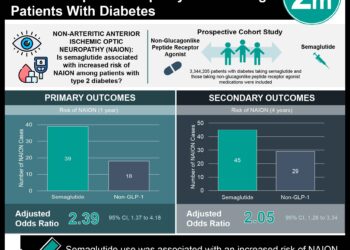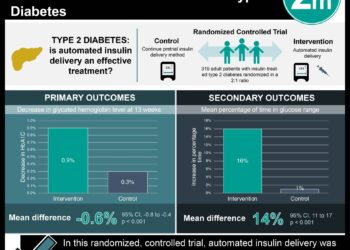Weight loss surgery may reduce risk of developing type 2 diabetes
1. When compared to matched controls, obese patients without diabetes at baseline who underwent bariatric surgery had a lower incidence of developing type 2 diabetes up to 7 years after the procedure.
2. The positive effect of bariatric surgery was similar across all age groups and in both genders.
Evidence Rating Level: 2 (Good)
Study Rundown: Obesity is rapidly becoming ubiquitous and the negative impact it has on nearly every organ system is well documented. Amongst other diagnoses, obese individuals are at an increased risk of developing type 2 diabetes. Traditional weight-loss regimens, which mainly focus on lifestyle changes, have high attrition rates and if weight is lost, patients may regain it rapidly. Bariatric surgery is a more radical option that many patients have had success with. This study aimed to investigate the preventative effect of bariatric surgery on the development of type 2 diabetes. This prospective cohort included obese individuals who had undergone bariatric surgery and compared them to matched controls who had not had the surgery. The patients were then followed for 7 years and the incidence of diabetes in each group was recorded. As hypothesized, the incidence of diabetes was significantly lower in the bariatric surgery group. The protective effect of bariatric surgery was consistent across age groups and both genders. The incidence of diabetes was significantly decreased regardless of the type of bariatric procedure (i.e. sleeve gastrectomy, laparoscopic gastric banding, or gastric bypass). Of note is that patients who underwent bariatric surgery were more likely to be prescribed statins, which may play a role in the development of diabetes. Furthermore, it is unclear if the expensive and more invasive nature of bariatric surgery made patient more committed to maintaining weight-loss during the follow-up period.
The study was funded by UK National Institute for Health Research.
Click to read the study, published today in The Lancet Diabetes & Endocrinology
Relevant Reading: Long term maintenance of weight loss with non-surgical interventions in obese adults: systematic review and meta-analyses of radomised controlled trials
In-Depth [prospective cohort]: The primary of endpoint of this study was the development of type 2 diabetes in obese subjects without diabetes at baseline, comparing those who had undergone bariatric surgery with those who had not. Only patients with a BMI of great than 30 and over the age of 20 were included. 2167 patients who had undergone bariatric surgery were included in the study. These patients were matched (by age, gender, BMI, and HbA1C) with controls who had not undergone the surgery. Three types of bariatric procedures were included in the study. 1053 patients underwent laparoscopic gastric banding, 795 had gastric bypass, and 317 had a sleeve gastrectomy.
At the end of the 7-year follow-up period, only 4.3% (95% confidence interval, [CI] 2.9-6.5) of bariatric surgery group developed diabetes, compared to 16.2% (95% CI 13.3-19.6) in the control group. The incidence rate was 5.7 diagnoses per 1000 person-years (95% CI 4.2-7.8) in the bariatric surgery group, compared with 28.2 (24.4-32.7) in the matched controls. The adjusted hazard rate for the development of type 2 diabetes in the bariatric surgery group was 0.2 (p < .0001). The protective effect of bariatric surgery did not vary significantly between age group or gender. The results suggest that for patients with a BMI >30 bariatric surgery is protective against the development of type 2 diabetes.
More from this author: Local excision inferior to major resection in T1-2 colon cancer and T2 rectal cancer, Secondary mastoid obliteration improves quality of life for patients with chronic otitis media, Healthcare reform linked with reduced racial disparities in surgical care, VATS lobectomy may be preferred in COPD with non-small-cell lung cancer, One-on-one training leads to improved virtual reality laparoscopic performance
Image: PD/CDC
©2012-2014 2minutemedicine.com. All rights reserved. No works may be reproduced without expressed written consent from 2minutemedicine.com. Disclaimer: We present factual information directly from peer reviewed medical journals. No post should be construed as medical advice and is not intended as such by the authors, editors, staff or by 2minutemedicine.com. PLEASE SEE A HEALTHCARE PROVIDER IN YOUR AREA IF YOU SEEK MEDICAL ADVICE OF ANY SORT.






